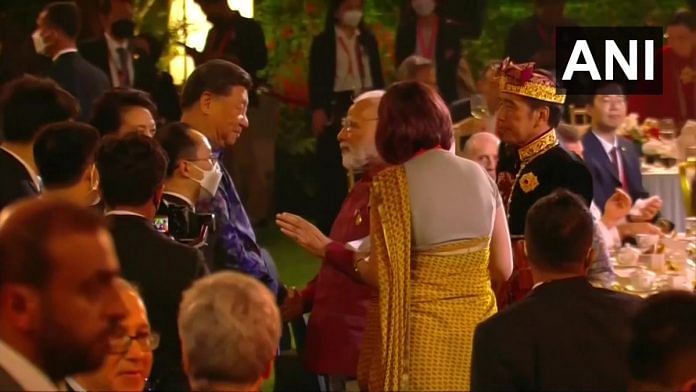Handshakes have changed the course of history and geopolitics, especially the ones between politicians, world leaders and diplomats. There are at least seven famous handshakes that changed the world. US President Ronald Reagan and Soviet leader Mikhail Gorbachev shook hands in Geneva on 19 November 1985 and held talks on improving diplomatic relations and limiting arms race. The handshake shook the foundations of the Soviet Union but also signaled the end of nearly five decades old Cold War. 37 years later, on 14 November 2022, Indian Prime Minister Narendra Modi and Chinese President Xi Jinping shook hands on the sidelines of the G20 meeting in Bali where India took over the leadership of G20 from Indonesia.
Unlike the Mao-Nixon handshake in 1972 during the first US presidential visit to China, Modi and Xi have met several times before. What the Modi-Xi handshake will lead to is difficult to predict but surely raises new hopes of thaw between the two countries.
How China weakened trust quotient
India and China have serious misgivings about each other’s positions on international affairs and regional engagements. China suspects the objectives of the Quad, which evolved from a disaster relief partnership after the tragic 2004 tsunami into a security and strategic partnership. China characterised Quad as ‘Asian NATO’ and is highly wary of attempts to strengthen Indo-Pacific as a group for trade and freedom of navigation as well as securing sea lines of communication (SLOC). China’s discomfort at the transition from Asia-Pacific to Indo-Pacific is understandable. Beijing did not consider New Delhi to be power strong enough to emerge as a leader in Asia and rub shoulders with world powers, both middle and the strong ones. The Trade War initiated during the Trump regime and the emergence of India as a strong and stable economy has also put Beijing on guard. While China has not been able to win the trust of the democratic world, India has successfully conducted its foreign policy to win friends and influence countries.
In contrast, China has weakened its trust quotient with neighbours, has few alliance partners, practically no friends and some sort of security agreement only with North Korea (Treaty of Friendship, Cooperation and Mutual Assistance signed in 1961). Even Putin, whom Xi Jinping described as “my best, most intimate friend”, is not happy with China making inroads in former Soviet Union territories in Central Asia or with its unsustainable claims in the South China Sea. The South China Sea could become a potential fault line between China and Russia as the former considers China’s position as detrimental to its energy security.
Also read: Biden and Xi shake hands in Bali but show they won’t stop blunting each other’s strengths
US, the balancer
Meanwhile, Joe Biden and Xi Jinping held their first face-to-face meeting in Bali on the sidelines of the G20 meeting and are likely to resume talks on security issues, besides climate change and trade issues. China claims to have obtained five “Nos” from Biden such as ‘not seeking change in the Chinese governance system’, ‘no Cold War with China’, ‘no alliances against China’, ‘no support to ‘independent Taiwan’ and no impediments in China’s economic growth. The US readout does not specify these claims but does mention US concerns over human rights violations in Tibet, Xinjiang and Hong Kong.
The US has been using unilateral sanctions against its adversaries as part of its foreign policy. This is followed by coercing friends and allies to walk on its footsteps. As part of this process, many high-ranking Chinese officials were barred from entering the US or holding official talks with any of its officials. Now this rule is coming back to bite its hands. In a strange paradox as part of the thawing process, the State Department has suggested resumption of ministerial-level dialogue between the two countries. Incidentally, the Chinese defence minister Li Shangfu is one of those barred by the US to hold talks with US officials.
Beijing should learn to appreciate New Delhi’s stand on ‘strategic autonomy’ vis-à-vis the US. India stood its ground firm in refusing to join the US bandwagon in condemning Russian invasion of Ukraine. India has every reason to be unhappy with Beijing for its misadventures in the northern border and defence supplies to Pakistan, which has bought 72 per cent of its total weapons from China accounting for 47 per cent of China’s total arms exports. China is also in the process of supplying SLC-18 space surveillance radar capable of tracking Low Earth Orbit (LEO) satellites to Pakistan. This will seriously imperil India’s LEO projects meant for peaceful purposes like communication, agriculture and weather forecast.
If Beijing is serious about taking the handshake any further, it should address India’s security concerns and desist from its shenanigans against India. While New Delhi looks forward to a positive response, it can also pay China back in the same coin, frustrate its military attempts and use all available leverages.
Given the multilateral nature of the emerging world order, no one country however strong it may be militarily or economically, will be accepted as a leader in a unipolar setting. China should come to terms with the ground reality and begin to engage with India as an equal partner rather than an adversary out to play spoilsport in China’s hegemonic ambitions. India and China can cooperate on issues of global importance and urgency, like climate change and tackling terrorism. There is enough time to resolve mutual differences but as equal partners.
Seshadri Chari is the former editor of ‘Organiser’. Views are personal.
(Edited by Anurag Chaubey)



